At some point in the early part of this century, America was treated to the concept of Bush Derangement Syndrome. The illness, Charles Krauthammer explained, entailed “the acute onset of paranoia in otherwise normal people in reaction to the policies, the presidency—nay—the very existence of George W. Bush.”
Then, as the day follows the night, Americans were bestowed with Obama Derangement Syndrome—an instinctual hostility to anything and everything the president said or did.
The operative definition of political derangement began to shift from the minute these “syndromes” were first “diagnosed.” Fortunately, the online dictionary is just a click away. Derangement, it turns out, actually means “a permutation of the elements of a set such that none of the elements appear in their original position.”
In other words, derangement isn’t about paranoia or hostility. It’s more akin to congenital hypocrisy—inexorably deviating from what you started out saying or doing.
Now that we’ve sorted out that bit of linguistic accuracy, it’s time to focus on the most egregious and revolting syndrome on display this summer: Lobbyist Derangement Syndrome.
Lobbyist Derangement Syndrome knows no clique or party. Much like herpes, it can lay dormant for months or years, only to flare up with shocking results. And so, with a surprising suddenness, it has recently bloomed up among Republicans and Democrats alike.
President Barack Obama has long used lobbyists as scapegoats. As Lee Fang recounted at The Nation, Obama made them a centerpiece of his campaign. “We are up against the belief,” he railed, “that it’s all right for lobbyists to dominate our government, that they are just part of the system in Washington. But we know that the undue influence of lobbyists is part of the problem, and this election is our chance to say that we’re not going to let them stand in our way anymore.”
Less than a month in office, Obama signed an executive order officially observing that registered lobbyists were unwelcome at the White House.
But, as Fang continued, the administration quickly evolved away from that position. “Obama’s only significant act to curb the influence of lobbyists is now seen as a failure. In fact, in many ways, he only made the problem worse.”
Yet the president refused to drop his demagoguery. Just this week, he told The Economist that corporations are lobbying too hard for lower taxes and the like. In literally the very same breath, however, he let slip that they ought to be lobbying even harder—for his agenda:
“When they come and they have lunch with me […] and they’ll say, you know what, we really care about the environment, and we really care about education, and we really care about getting immigration reform done—then my challenge to them consistently is, is your lobbyist working as hard on those issues as he or she is on preserving that tax break that you’ve got? And if the answer is no, then you don’t care about it as much as you say.”
Not only is this deranged in the technical sense. It’s deranged in the pejorative. Sadly, Republicans—who have repeatedly slammed Obama for this kind of blithe incoherence—are not immune to the same disorder.
Take the nasty case of House Majority Whip Steve Scalise, who sat down recently to interview for a new communications director with the aid of John Feehery, a high-powered lobbyist. That’s right—a sitting member of Congress with a leadership position brought in a registered super-lobbyist to help him pick the right hire for his team.
Not, as a lawyer might say, that there’s anything wrong with that. In all likelihood, Scalise hasn’t run afoul of any House ethics rules. Nevertheless, the influence of the lobbyist-loving Feehery wing of the GOP is plain to see. Just a few weeks before he was outed in the Scalise meeting, Feehery penned a Wall Street Journal op-ed on “the risk in Republican hostility to big business”—accompanied by the world’s smallest violin.
Freehy was particularly worried about the hostility towards the Export-Import Bank, an agency that doles out millions of dollars every year to well-connected corporations. Populists on both sides of the aisle have long decried the bank as “little more than a fund for a fund for corporate welfare,” to borrow then-Senator Barack Obama’s 2008 memorable description.
“Amid the fight for the soul of the Republican Party,” he intoned, “some elements of the GOP coalition have become overtly hostile to Big Business. […] The Export-Import Bank has become the latest in a long line of targets,” groaned Feehery, raising the specter of a Chamber of Commerce defection to the Dems. “What would happen,” he cried out, “if Big Business decided to change sides?”
He sighed. “How the Export-Import Bank” became a target “for Tea Party wrath is a little strange to me.”
Except, wait. That last quote wasn’t Feehery. It was Barack Obama, in that Economist interview this week.
Lobbyists and the politicians who love them have already won the fight for the soul of both parties. If Republicans or Democrats are ever going to recover from Lobbyist Derangement Syndrome, someone’s going to have to come along and take it back.






